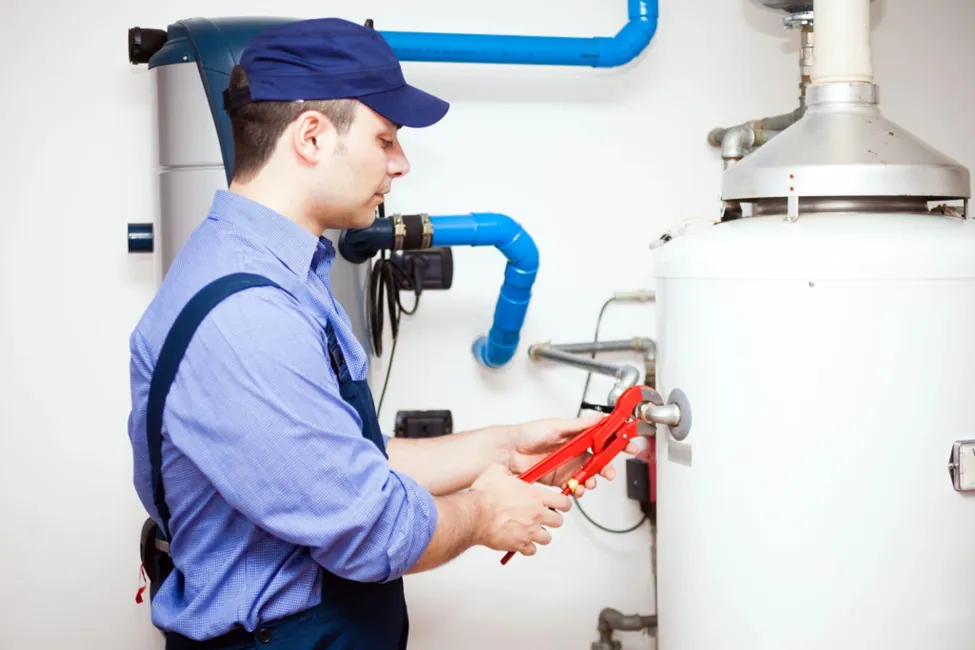HOME IMPROVEMENT
Essential Seasonal Plumbing Maintenance Tips to Avoid Costly Repairs

Seasonal plumbing maintenance is vital to ensuring that plumbing systems are functional and efficient year-round. Regular upkeep can significantly lower the likelihood of expensive repairs. As the seasons change, different stressors impact piping, fa7ucets, and other components of the plumbing system. By adhering to a systematic approach to seasonal maintenance, homeowners can prevent issues before they escalate. This article will discuss specific tasks for each season to keep plumbing in optimal condition and avoid hefty repair bills.
Preparing Your Plumbing System for Spring
Spring is an opportune time to give the plumbing system a thorough once-over. The colder months can cause considerable strain, resulting in potential wear and tear that needs addressing.
First, inspect all visible pipes for any damage incurred during winter. Look for cracks, leaks, or corrosion. Undetected leaks can lead to water wastage and even structural damage if not repaired promptly.
Additionally, thoroughly clean gutters and downspouts to ensure they are free from debris. Blocked gutters can cause water to back up, leading to potential leaks and water damage inside the house. Outdoor drains and sewer lines should also be checked for clogs. By ensuring these areas are clear, homeowners can prevent water pooling and associated damage.
Don’t forget to give outdoor faucets and hoses a once-over. Check for leaks and ensure hoses are free of cracks. Outdoor fixtures are particularly susceptible to the elements and minor issues can escalate if neglected.
Summer Plumbing Maintenance Tips
During summer, higher usage of irrigation and watering systems can present unique challenges. Start by inspecting sprinkler systems and any irrigation setups. Ensure they are operating correctly and there are no leaks, which can lead to water wastage and increased utility bills.
Monitoring water pressure is also crucial. High temperatures can exacerbate existing issues, so keep an eye out for any signs of leaks around the home.
Sump pumps are another essential component to examine during summer. Clean and test the pump to confirm it is working correctly. These devices are indispensable in preventing basement flooding, particularly during summer rainstorms.
Lastly, flush water heaters to remove sediment build-up. Over time, minerals can accumulate, reducing efficiency and potentially damaging the unit. By flushing the system, homeowners maintain optimal performance and extend the heater’s lifespan.
Fall Plumbing Check-Up
As the weather starts cooling down, fall is the perfect time to prepare the plumbing system for the oncoming frost. Begin by insulating exposed pipes to help prevent freezing once temperatures plummet. Pipe insulation is a cost-effective way to avoid bursts and leaks due to cold weather.
Outdoor hoses should be drained and stored away, and exterior faucets should be shut off. This simple task prevents water from freezing within and causing damage.
Check the water heater’s efficiency; it may need a tune-up before the colder months set in. An efficient water heater is crucial during winter for both comfort and utility savings.
Gutters, often filled with falling leaves during autumn, need to be cleaned to avoid blockages and subsequent water damage. Ensuring clear paths for water drainage can save significant repair costs down the line.
Winter Plumbing Protection Tips
Winter presents some of the most challenging conditions for plumbing systems. One effective prevention method is to keep a slow drip on faucets to prevent pipes from freezing. Moving water is less likely to freeze.
Additionally, ensure proper insulation throughout the plumbing system. Pipes located in unheated areas such as crawl spaces or attics are particularly vulnerable. Foam pipe covers are an affordable and efficient solution.
Check for drafts in areas where pipes are present. Sealing any gaps helps in maintaining temperature and preventing freezing.
Most importantly, know the location of the main water shut-off valve. In case a pipe does burst, turning off the main supply quickly can avert extensive damage.
General Year-Round Plumbing Tips
Plumbing systems benefit immensely from regular checks and maintenance, regardless of the season. Always be on the lookout for signs of leaks or water damage. Early detection can prevent minor issues from becoming major repair jobs.
Routine maintenance on major appliances, like dishwashers and washing machines, ensures they operate efficiently and don’t cause unexpected plumbing problems.
Using water softeners can help reduce mineral build-up in pipes, prolonging their lifespan and reducing the likelihood of clogs.
Lastly, scheduling annual professional inspections ensures the overall health of the plumbing system. Professionals can identify and rectify potential problems that may not be visible to the untrained eye.
Conclusion
Seasonal plumbing maintenance is undeniably crucial for avoiding costly repairs and ensuring the longevity and efficiency of the plumbing system. By following a structured approach to maintenance, homeowners can address issues specific to each season – from spring plumbing maintenance checklists to winter protection tips. Regular inspection, timely repairs, and professional check-ups offer peace of mind and significant savings in the long run. Embrace a routine of proactive maintenance to keep plumbing systems in top shape, thereby mitigating the risks of unexpected breakdowns.
HOME IMPROVEMENT
How To Know if Granite Countertop Installation Is Right for Your Home

New countertops can transform a space’s overall appearance and functionality, allowing homeowners to customize their homes. There are many countertop materials to choose from, including natural stones like granite. Granite is suitable for home use due to its durability, versatility, and comprehensive color options. Here are six factors to evaluate when determining if a granite countertop installation is right for your home:
1. Durability and Longevity
Different countertop materials have varying degrees of hardness and damage resistance. Granite is a durable material with a high hardness level, making scratches and chips unlikely to occur. Unlike softer materials that may show signs of wear and tear over time, granite maintains its appearance well, even with regular use.
The natural stone will remain flat as it is resistant to warping and bowing. Homeowners can install it in areas prone to heavy daily activities, such as kitchens and bathrooms. Granite’s durability also allows it to be used for outdoor applications like patio tables, poolside bars, and outdoor kitchens.
2. Maintenance Requirements
Understanding a countertop material’s maintenance requirements helps homeowners make decisions that align with their lifestyle and long-term satisfaction goals. Granite countertops have relatively low maintenance requirements. This stone is a porous material, meaning it can absorb liquids if not properly sealed. Sealing helps protect the surface from stains, enhancing its durability and appearance.
Depending on the type of sealer used, granite countertops may need to be resealed occasionally to keep them in top condition. Avoid abrasive cleaners or harsh chemicals that can damage the sealant or the granite surface. For routine cleaning, homeowners can use a mild soap and water solution to wipe down the countertops.
3. Functionality
When evaluating a granite countertop installation, homeowners should make sure the material meets their functional needs. Granite is naturally heat resistant, which means homeowners can briefly place hot pots and pans directly on the countertop without causing damage. This feature adds to its functionality and convenience in the kitchen. It also makes granite a suitable bathroom countertop surface for individuals who use hot hair tools. Granite’s versatility adds to its functionality, allowing homeowners to use it for various designs and applications, including backsplashes and kitchen islands.
4. Aesthetic Preferences
Updating a home’s kitchen or bathroom countertops allows homeowners to personalize and coordinate their space. Granite comes in a wide range of colors, from subtle hues like beige and gray to bold colors like blue and red. This variety allows homeowners to choose a granite slab that complements the room’s overall look. The natural stone can be paired with other kitchen and bathroom design materials, such as wood and stainless steel. Its natural patterns, veining, and specks also add depth and character to the countertop, creating a visually appealing focal point.
5. Resale Value
Granite countertops make a suitable investment for homeowners planning to sell their homes in the future. When properly sealed and cared for, granite countertops can last for many years. Buyers may value this durability, as it indicates a long-lasting and low-maintenance feature in the home, reducing the need for immediate replacements or repairs. Granite also complements a variety of home aesthetics. Whether a buyer prefers a traditional, modern, or transitional look, they can easily decorate their new home to fit their style.
6. Installation Requirements
The installation requirements of your chosen countertop material affect your project’s timeline, budget, and overall convenience. Granite countertops may require professional assistance due to their weight and specific installation techniques. During the installation process, experienced installers work with homeowners to measure and prepare the space.
They can provide an estimate of the cost of labor, specialized tools, and materials needed for the project. This estimate allows homeowners to budget and plan accordingly for a high-quality granite countertop installation. The installer also makes sure the countertop’s underlying cabinets and support structures are sturdy enough to bear the granite stone’s weight. Working with a trained contractor helps promote a safe and successful countertop installation.
Schedule a Granite Countertop Installation Today
Evaluating factors such as a countertop’s durability, maintenance requirements, and aesthetic options allows homeowners to choose a material that best suits their needs. Granite countertop installation provides a strong and scratch-resistant surface solution for frequently used areas of the home. Contact an experienced natural stone supplier and installer today to browse their products.
HOME IMPROVEMENT
Exploring Comfort Meets Contemporary Design: The Hallerbos Sofa Set

In the realm of interior design, the fusion of comfort and contemporary aesthetics has become increasingly sought after. The Hallerbos Sofa Set emerges as a testament to this harmony, embodying the perfect balance between indulgent comfort and sleek, modern design. In this article, we delve into the allure of the Hallerbos Sofa Set, examining its ergonomic features, minimalist design elements, and the seamless integration of functionality and style.
Comfort Redefined
The Hallerbos Sofa Set transcends conventional notions of comfort, offering an unparalleled lounging experience. Crafted with meticulous attention to detail, its ergonomic design contours to the body, providing optimal support and relaxation. Sink into the plush cushions, enveloped by sumptuously soft upholstery, and feel the stresses of the day melt away. Whether you’re unwinding after a long day or hosting guests for a cozy evening, the Hallerbos Sofa Set ensures comfort is never compromised.
Contemporary Design Elements
At the heart of the Hallerbos Sofa Set lies its contemporary design ethos. Characterized by clean lines, minimalist aesthetics, and a focus on functionality, this sofa set seamlessly integrates into modern living spaces. Its sleek silhouette adds a touch of sophistication, while the absence of unnecessary ornamentation exudes an air of understated elegance. Whether adorning a chic urban loft or a minimalist apartment, the Hallerbos Sofa Sets serves as a captivating centerpiece, effortlessly elevating the aesthetic appeal of any room. Discover the epitome of modern living with this product.
Functionality and Practicality
Beyond its aesthetic allure, the Hallerbos Sofa Set is lauded for its practicality and functionality. Designed with the modern homeowner in mind, it boasts multi-functional components and space-saving features. Convertible mechanisms effortlessly transform the sofa into a sleeper, accommodating overnight guests with ease. Meanwhile, built-in storage compartments provide a discreet solution for stowing away blankets, cushions, and other essentials, maintaining a clutter-free living space. With durability and longevity at its core, the Hallerbos Sofa Sets offers not only style but also practicality for everyday living.
Customer Satisfaction and Reviews
The true measure of any furniture piece lies in the satisfaction of its users, and the Hallerbos Sofa Set garners rave reviews from discerning homeowners. Testimonials from satisfied customers attest to its unrivaled comfort, impeccable craftsmanship, and timeless design. From solo dwellers seeking solace in its embrace to families bonding over movie nights, the Hallerbos Sofa Sets has become an indispensable companion in countless homes. Real-life examples showcase how this sofa set has transformed living spaces, instilling a sense of warmth and sophistication.
Sustainability and Ethical Manufacturing
In an era where environmental consciousness is paramount, the Hallerbos Sofa Set stands out for its commitment to sustainability and ethical manufacturing practices. From responsibly sourced materials to eco-friendly production methods, every aspect of its creation is geared towards minimizing environmental impact. Moreover, the manufacturer’s dedication to social responsibility initiatives ensures fair labor practices and supports local communities. By choosing the Hallerbos Sofa Sets, consumers not only elevate their living spaces but also contribute to a greener, more equitable world.
Comparisons with Other Sofa Sets
In a crowded marketplace inundated with furniture options, the Hallerbos Sofa Set shines as a beacon of excellence. Contrasting traditional sofa sets with contemporary counterparts highlights its innovative design and superior comfort. When pitted against other contemporary offerings, its versatility, durability, and aesthetic appeal emerge as distinguishing factors. Whether compared on price, quality, or design, the Hallerbos Sofa Sets invariably emerges as the preferred choice for those seeking the perfect amalgamation of comfort and style.
Conclusion
As we conclude our exploration of the Hallerbos Sofa Set, it becomes evident that this furniture piece transcends mere functionality to embody a lifestyle statement. With its unrivaled comfort, contemporary design elements, and commitment to sustainability, it epitomizes the epitome of modern living. Whether nestled in a chic urban loft or adorning a cozy suburban home, the Hallerbos Sofa Sets exudes timeless elegance and effortless sophistication. For those who prioritize comfort without compromising on style, it serves as an irresistible invitation to indulge in the art of living well.
HOME IMPROVEMENT
7 Creative Ways to Boost Your Home’s Curb Appeal With Exterior Renovations

Are you looking to transform the look of your home without breaking the bank?
Exterior renovations can be the perfect solution to boost your home’s curb appeal, making it stand out in the neighborhood. From simple tweaks to more significant changes, this article explores seven creative ways to enhance your home’s exterior.
Whether you’re looking to sell your home or simply want to make it more inviting, these tips will help you achieve a fresh, new look that will catch everyone’s eye.
1. Update the Front Door
Updating front of houses, can dramatically change your home’s appearance. You can paint it a new color or replace it altogether with a modern design. Adding new hardware like a stylish doorknob or a smart lock can also make a big difference.
2. Add Exterior Lighting
Adding exterior lighting can make your home safer and more welcoming at night. Install lights along pathways, near the front door, or around your garden to highlight your home’s best features. This upgrade not only improves visibility but also adds a warm ambiance to your outdoor spaces.
3. Upgrade the Garage Door
Upgrading your garage door can significantly improve your home’s overall look. You can choose a new door that matches your home’s style or one that stands out as a feature. A new garage door not only looks good but can also increase your home’s security.
4. Enhance Landscaping
Improving your landscaping is an effective way to beautify your small house exterior. You can plant flowers, shrubs, or even a tree to add color and life to your outdoor space.
Regular maintenance, such as mowing the lawn and trimming plants, keeps your yard looking neat and tidy. If you have a pathway leading to the entryway, consider the best paver installation to complement the overall design and provide a durable and attractive walking surface.
5. Install Window Shutters
Installing window shutters can enhance your home’s aesthetic and offer added privacy. They are available in various styles and colors to match any home design. Shutters also provide an extra layer of insulation, which can help regulate indoor temperatures and reduce energy bills.
6. Upgrade Exterior Finishes
Upgrading the finishes on your home’s exterior can give it a refreshed look. This can involve repainting the siding, trimming, or even replacing old materials with new, more durable options. It can help protect your home from the elements and improve its overall value.
7. Add Architectural Details
Adding architectural details to your home can give it a unique character. This could include features like decorative trim, molding around windows and doors, or a custom mailbox. Such details can set your home apart from others and reflect your personal style.
Elevate Your Home’s Charm With Exterior Renovations That Turn Heads
Enhancing your home doesn’t have to be a daunting task. With these exterior renovations, you can make a big impact with just a few changes. Remember, it’s all about creating a space that you love and that welcomes you every time you come home.
Whether it’s a new front door, brighter lights, or beautiful landscaping, each step you take adds value and beauty. Start imagining the possibilities and make your home the envy of the neighborhood with these simple upgrades.
Were you satisfied with the information in this article? If yes, our blog offers even more valuable resources.

 HOME IMPROVEMENT12 months ago
HOME IMPROVEMENT12 months agoThe Do’s and Don’ts of Renting Rubbish Bins for Your Next Renovation

 BUSINESS1 year ago
BUSINESS1 year agoExploring the Benefits of Commercial Printing

 BUSINESS12 months ago
BUSINESS12 months agoBrand Visibility with Imprint Now and Custom Poly Mailers

 HEALTH8 months ago
HEALTH8 months agoThe Surprising Benefits of Weight Loss Peptides You Need to Know

 TECHNOLOGY10 months ago
TECHNOLOGY10 months agoDizipal 608: The Tech Revolution Redefined

 HEALTH7 months ago
HEALTH7 months agoYour Guide to Shedding Pounds in the Digital Age

 HOME IMPROVEMENT7 months ago
HOME IMPROVEMENT7 months agoGet Your Grout to Gleam With These Easy-To-Follow Tips

 HEALTH11 months ago
HEALTH11 months agoHappy Hippo Kratom Reviews: Read Before You Buy!









